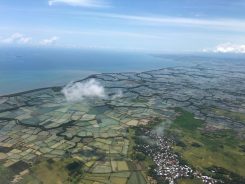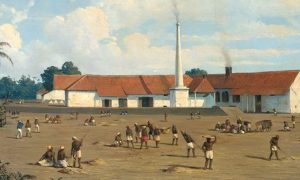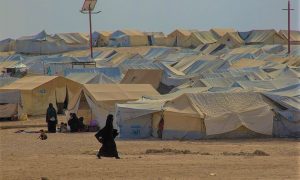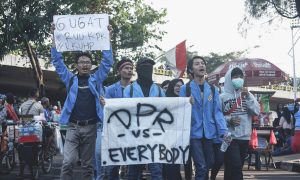Recent events in Afghanistan, where the Taliban have retaken political control, have also triggered political concern in Indonesia. This holds true not only in terms of current support and sympathies for the Taliban but also, as Kathryn Robinson explains well, when it comes to the memories of Indonesia’s own past and traumas of radical Islamic rule under the banner of the Darul Islam movement, which started in 1949 and occupied large areas especially in West Java and southern Sulawesi in the late 1950s until the mid-1960s. Kathryn Robinson stresses the cruelty of the Darul Islam forces, which not only introduced polygamy and the infamous hudut-punishments such as stoning for adulterers and amputation of arms for thieves, but which also evicted non-Muslim populations as they feared that they would support the Indonesian Army, Darul Islam’s enemy. This evoking of memories is important if one wants to understand how non-Muslim minorities at a local level perceive globally mediated events, as events in far-away Afghanistan may have concrete meanings in the local contexts elsewhere.
In my research on indigeneity among the Duri in the highlands of South Sulawesi I frequently came across narratives and memories of the Darul Islam movement, which had one of its strongholds in the area between the Christian Toraja in the north and the Bugis-dominated lowlands in the south. The rugged landscape, ideal for their guerilla warfare, and the fact that the Duri were already Muslims were the most important preconditions allowing Darul Islam rule there for more than a decade. However, their rule would probably less stable there if they would not have enjoyed support of the local population.
While indigenous organisations often stress traditions such as animist beliefs and traditional political organisation, I expected to find many stories critical of the Darul Islam movement among indigenous activists and in villages now applying for recognition as indigenous communities. After all, the Darul Islam movement not only banned the pre-Islamic features of the Duri’s worldview (known as Aluk Tojolo in Duri and similar to Torajan traditions of, for instance, ancestor worship) but also aimed to destroy all traditional political hierarchies and political institutions that they saw as being at odds with proper Islam. I was, however, surprised to find that local activists belonging to Indonesia’s largest indigenous organisation, AMAN (Aliansi Masyarakat Adat Nusanatara, The Indigenous Alliance of the Archipelago), never criticised Darul Islam. Many even defended Darul Islam and its charismatic leader Kahar Muzakar. A critical stance toward Darul Islam would be in line with official state narratives that describe Darul Islam as gerombolan (gangs) and as anti-nationalist troublemakers, although that did change somewhat in post-authoritarian Indonesia.
The traumas of the period in which Darul Islam ruled the area are still present. Not only is that time remembered as an era of shortages of essential items such as salt or clothes, but also as an era of violence. “The life of a human being,” a local AMAN activist told me “was worth no more than the life of a chicken.” But in contrast to the narratives collected by Kathryn Robinson in Sorowako, many Duri rather blame the Indonesian Army for destroying their houses every time the army found a village that supported Darul Islam troops. During these years of violence and uncertainty, the Duri adapted to a provisional way of life, only building simple houses that could more easily be rebuilt after a raid.
Despite these difficulties, many local peasants supported Darul Islam troops with their agricultural products, both food and cash crops. Coffee was given to Darul Islam fighters and brought to the port of Palopo in order to sell them. People told me they did this voluntarily as they believed in the Darul Islam movement. In order to understand their support and their still sympathetic views, it is important to consider local history and the rapid social changes experienced in the area in only 50 years, a change which transformed society from a feudal society with slaves and debt bondage to a kind of Islamic socialism.
Duri History and Social Change
In 1906, the Dutch gained direct control over what is now the province of South Sulawesi and introduced profound social change. While they cooperated closely with the high ranks of the traditional elite, they not only outlawed slavery but treated all people outside the upper elite equally. The petty nobility were suddenly equal with former slaves. In the years of the brutal Japanese occupation, even this clear-cut distinction between the ruling nobility and all others was erased; all became equally oppressed by the Japanese military regime and were forced into compulsory labour.
These changes made it possible for local people to imagine equality in terms of social class. A “positive” equality in which local people were not merely equally oppressed, but in which they could actively build a new society was now, against their traditions, something imaginable. In some parts of the Torajan highlands and in the Bugis lowland, the Communist Party expressed such aspirations. Darul Islam and the communists became competitors for peasant support as they both agitated under the banner of social equality. Among the Duri, the idea of social equality was best articulated in terms of Islam. The Darul Islam movement introduced land reform and banned all traditional noble titles and privileges. This ensured the support of many local peasants and made Duri society much more equal—with the important exception of gender relations. This change had some long-lasting effects. Compared to Torajan societies, for instance, traditional elites are nowadays less important in local politics. Post-Darul Islam Duri societies fit much better into indigenous activists’ images of relatively equal social units. However, it is also striking that indigenous activism is much more often led by women in Toraja than in the Duri highlands.
Another factor important for local support of Darul Islam was that for the Duri, outside forces had often been a threat. The Dutch and Japanese forces may have set some preconditions for making a more egalitarian society imaginable, but they were also forces of heteronomy. As the Indonesian nationalist movement was quite weak in rural Sulawesi in the 1940s, the Indonesian army in the 1950s and 1960s was often perceived as a Javanese army and therefore as another means of alien domination. By contrast, Darul Islam recruited their troops from the local population.
The anti-traditional rule of the Darul Islam movement had a tremendous impact on indigeneity and the way that it is constructed today among the Duri. In order to get recognition as an indigenous community, AMAN activists have to collect ethnographic data to prove that the community in question is still indigenous. In such a document prepared by local AMAN activists, for instance, the death penalty for adulteresses was mentioned as a customary law and it is very likely that this was an impact of the Darul Islam movement. This is, however, just portrayed as customary law with no further references by the AMAN activists. Also, there are no references to traditional worldviews of Aluk Tojolo in the ethnographic data collected and represented by AMAN. Rather, indigeneity is always portrayed as Islamic among the Duri. Where rituals are mentioned, it is always made clear that they are conducted in order to worship Allah. When local AMAN activists told me that Darul Islam troops cut down large trees in order to prevent worship of spirits, the activists did not feel that this affected their indigeneity which retrospectively emerges as a pious Islamic indigeneity.
An influx of new ideas might boost rural and coastal sectors, but unemployment looms large too.
Disrupting pathways: What awaits rural youth forced home by COVID-19?
In 2016, the regency of Enrekang, of which the Duri highlands is a part, adopted one of the first local regulations (peraturan daerah) for the recognition of indigenous communities—a necessary step for all communities who want to apply for customary forest custodianship. Initially, this peraturan dearah was rejected by some Islamic groups in Enrekang, including the Islamic PKS party. But local indigenous activists managed to convince these groups that indigeneity is not at odds with Islam. Eventually, all fractions within the local parliament approved the local regulation on the recognition of indigenous communities.
Nowadays, some women engaged in the indigenous movement in the Duri area use indigeneity as a tool for achieving gender equality, for instance by organising indigenous women in order to ensure that they participate in economic and social activities. But the very idea that society can be organised in an egalitarian way is without doubt also a legacy of the Darul Islam movement. Thus indigeneity, when it emphasises social equality, is a very modern phenomenon: its progressive qualities are rooted in radical social change which emphasises social equality and therefore in a certain way even in the harsh rule of Islamic fundamentalists.
On the surface, people often said during the research that they supported the Darul Islam movement because it helped them to become better Muslims. But maybe there is more to it than that: being a good Muslim does not only mean not eating pork or performing regular prayers. In the context of Duri societies it also meant that (male) commoners and nobles had equal rights when they abandoned tradition and embraced what Darul Islam perceived as proper Islam. Stoning is without doubt a cruel practice, but the very idea of applying it equally to former nobles and people in debt bondage was revolutionary.
Sometimes, when I argue with Indonesian friends about the Taliban, it occurs to me that they have something else in mind than I do. The same holds true for Darul Islam and other radical Islamic movements. Where I see the cruel punishment, discrimination against women and violence, they see a political and legal system that provides at least some egalitarian justice in an otherwise corrupt environment. In my universalist view (to which I still subscribe) I believe that I have a crucial point in denouncing the Darul Islam movement. However, in some dark moments I cannot help but admire their political struggle against traditional hierarchies and for social equality. The ongoing mystique of an Islamic state in Indonesia is perhaps rooted, among others, in these powerful political programs of social equality. If that is true, fighting against radicalisation also means providing alternative ways of articulating social demands.
 Facebook
Facebook  Twitter
Twitter  Soundcloud
Soundcloud  Youtube
Youtube  Rss
Rss 



